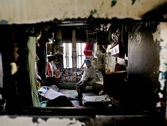Objectives
|
Prisons are often described as “breeding grounds” for radicalisation and violent extremism, since they are highly unsettling environments in which individuals are more likely than elsewhere to explore new beliefs and associations. Deprived of their existing social networks and given the conditions of their confinement, prisoners with no previous involvement in politically motivated violence are vulnerable to being radicalised and recruited into terrorism. A key driver of radicalisation prevention in prisons is the training and awareness raising of the staff. First line workers have been identified as a key group that can make an important contribution to this issue and include prison and probation staff.
Radicalisation Prevention in Prisons (R2PRIS) Project seeks to reduce radicalisation and extremism inside prisons by enhancing the competences of frontline staff (correctional officers, educational staff and psychologists, social workers) to identify, report and interpret signals of radicalisation and respond appropriately. Specific goals included: 1. Create awareness on the broad picture of terrorism, the mind set and narratives used by understanding
2. Develop the tools and instruments for prison administration and line-level staff to recognize signs of radicalisation at an early stage within their specific facility; 3. Provide common, consistent and effective instruments to help staff report their observations to the appropriate intelligence staff; 4. Provide model procedures for intelligence staff to vet the data they receive from prison staff and to appropriately interpret it; 5. Establish a series of training programmes and tools for all staff within a prison to respond appropriately to potential vulnerable individuals at risk of radicalisation. |
Results
The following results where achieved during the R2PRIS project:
- An innovative methodological framework for analysing deradicalisation and prevention of radicalisation strategies within prison;
- A radicalisation screening tool, with respective assessment materials and guidelines for prison administration and line-level staff to recognise signs of radicalisation at an early stage within their specific facility. The tool will be adapted to the specific legal and cultural context of the countries involved in the project;
- A training course for all staff within a prison on how to detect and respond appropriately to potential vulnerable individuals at risk of radicalisation;
- An e-learning training course;
- A train the trainer course;
- Five national seminars and an international seminar;
- A handbook and online repository of best practices on radicalisation prevention in prisons, than can be used by trainers;
- Three short-term transnational staff trainings.
|
The R2PRIS project is co-financed by ERASMUS + programme ( KA2 - Strategic partnerships for adult education). ERASMUS + is the new EU programme for Education, Training, Youth, and Sports (2014-2020).
This website has been accomplished during the project “Radicalisation Prevention in Prisons” - 2015-1-PT01-KA204-013062 (R2PRIS), implemented with the financial support of the European Commission through the Erasmus + Programme. This publication reflects the views only of the author, The Portuguese National Agency ERASMUS+ Education and Training and the European Commission cannot be held responsible for any use which may be made of the information contained therein. © Developed by IPS_Innovative Prison Systems
|




